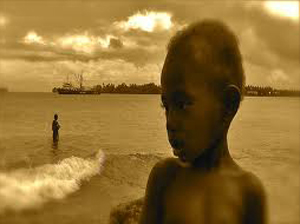
MELBOURNE (Radio Australia/Pacific Media Watch): Australia's Greens Party is going to push for legislation preventing Australian mining companies from engaging in environmental practices overseas that they could not do at home.
This is a response to the recent legal decision in Papua New Guinea, allowing the Chinese-owned Ramu Nickel Mine to dump up to 5 million tonnes of toxic waste into the Astrolabe and Basamuk bays off Madang.
The Greens Party holds the balance of power in Australia's Senate at the moment.
Greens leader, Senator Bob Brown has just visited Madang.
He says Australia needs to take action because this legal decision is not just an internal matter for PNG.
Correspondent: Bruce Hill
Speaker: Senator Bob Brown, leader of Australia's Greens Party
Hear the ABC audio
BROWN: It's a global issues because all our oceans are interlinked and the marine heritage and we're talking here about some of the richest eco-systems in the world belong to everybody, as well as to the unfortunate locals who have tried so hard in the courts to stop five million tonnes of toxic waste being dumped into the ocean eco-system off the north coast of Papua New Guinea.
HILL: Is this a decision that would have taken place in an Australian court of a similar thing had been proposed?
BROWN: No, it simply would not happen in an Australian court and one has to doubt it would happen in a Chinese court. It's a Chinese company of course working on the back of an Australian company which first opened up this venture. They're both very happy with the outcome, because they can see the profits coming from the development of the Ramu nickel mine and the..... that comes with it. But put the toxic waste into the marine eco-system, as well as I understand the sewerage from the mine system and who knows what else. It's an appalling indictment of modern technology being brought to Papua New Guinea without the safeguard that you would get in the home countries against this sort of destruction of marine eco-systems.
HILL: Well, this is a judgement about a tailings distribution system by a Chinese-owned company in Papua New Guinea. In what sense does this become an Australian issue?
BROWN: Well, of course, the mine was first mooted by an Australian corporation which still has - that's Highlands Pacific - which still has nine percent of the holdings and I understand can increase that to over 20 percent again as the mine gets underway and becomes profitable. It's very much an Australian corporation and an Australian responsibility and of huge interest to Australia. It points again to the need for Australian laws which require corporations from Australia to behave overseas in exactly the same way they would be required to if they were operating here in Australia under Australian law.
HILL: Well, your party the Greens, holds the balance of power in the Australian Senate. Are you going to put pressure on the Australian government to do something about this and if so, what?
BROWN: Yes, I have asked, I was in Madang in May. I came back to the Senate and spoke about just this mine and warned about it in the Australian Senate. But of course the Greens are a minority there and the big parties are so far turning their back on their responsibility to speak up about what is potentially an underwater Ok Tedi, exported again from Australia and an Australian mining company to the loss of the people who depend upon the environment, on this occasion a marine environment in Papua New Guinea.
HILL: So what is it you want the Australian government to do, what are you proposing?
BROWN: Well the Australian government should be firstly legislating to prevent Australian companies operating overseas from treating the environment in other peoples countries in a way that would be illegal home here in Australia.



